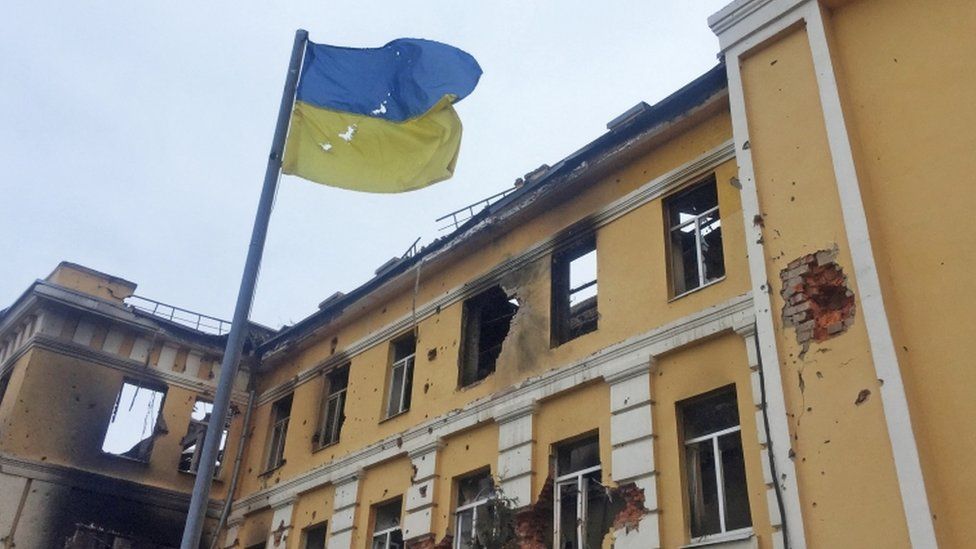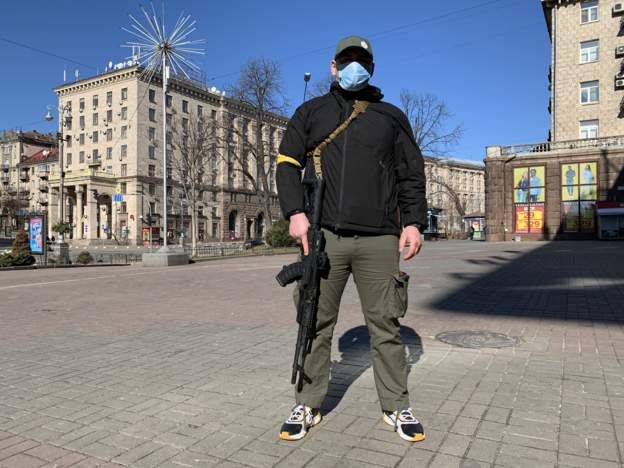Ukraine conflict: Your guide to understanding day five
 Image source, Reuters
Image source, ReutersDay five of the Russian invasion saw an escalation in fighting, even as Russian and Ukrainian representatives held their first face-to-face talks since the conflict began.
Russia is becoming more isolated, with President Putin's announcement that he had put Russia's nuclear forces on "special" alert causing widespread alarm.
The Kremlin on Monday said that Russia's move was prompted by comments from UK Foreign Secretary Liz Truss and others, something dismissed by the British foreign office.
But what does Putin's announcement mean? Here's the verdict of our security correspondent.

Russia accused of shelling residential areas
On the ground, dozens of people were killed on the fifth day of the Russian invasion as the city of Kharkiv was hit by heavy rocket fire, according to Ukrainian officials.
Videos on social media showed rockets landing all over Kharkiv, Ukraine's second city, which has a population of 1.4 million. Hundreds were also reported injured.
Russia has previously denied targeting residential areas.
Meanwhile, Russian and Ukrainian representatives held talks in Belarus. Expectations for an immediate resolution were not high before the meeting and after several hours the talks ended, with reports that a second round could take place in the coming days.
As night fell air raid sirens were once again heard in Kyiv and residents had to take shelter amid reports of new Russian attacks on the outskirts of the capital. Satellite images revealed a long convoy of Russian military vehicles heading south towards Kyiv.

'The war has united people as never before'
Oleg Karpyak, BBC Ukrainian, Kyiv

Underground and above ground in central Kyiv, more and more life has been slowing to a stop.
The underground metro now only operates a train every hour or two and carriages are half empty. Meanwhile, people continue to use the stations, deep beneath the city, as bomb shelters.
Some of the people out on the streets today were Russian-speakers, the people Russia has accused Ukraine of persecuting.
Tamara speaks good Ukrainian but from her words I can tell her native language is Russian. She says she and her husband are from Kharkiv, a mainly Russian-speaking city in east Ukraine. Russian artillery has hit it heavily today.
She speaks about the immense sense of unity, support and care among Ukrainians and breaks into tears.
A young man approached me with a black AK-47 on his shoulder and a yellow band around his right arm - a symbol that he is a civilian volunteer. He is called Artem and uses Russian and Ukrainian mixed in his conversation.
Artem said that as a Russian-speaker, he'd never encountered any problems in Ukraine before the invasion.
"This war has united people as never before," he said.

A huge refugee crisis
The United Nations' refugee agency says half a million people have now fled Ukraine to neighbouring countries. The BBC's Jeremy Bowen saw queues of about a mile (1.6km) at one of the many border crossings into Poland. He says people are travelling on foot as well as in cars and coaches, and many of those being brought to the border are children.
More than 100,000 people are also displaced within Ukraine, according to the UN.
The BBC's Fergal Keane witnessed angry scenes at Lviv station as desperate families tried to board trains, with pushchairs lifted over the heads of the crowd to the platforms.

Russia's interest rate doubled
Russia doubled its interest rate to 20% as sanctions caused its currency to plunge in value.
The collapse in value of the Russian rouble erodes the currency's buying power and could wipe out the savings of ordinary Russians.
"There are no dollars, no roubles - nothing! Well, there are roubles but I am not interested in them," a man queuing at an ATM in Moscow told the BBC.
There were fears of a possible run on banks in the country, after long queues were seen at cash machines as well as in some food shops.
Despite the financial hit the Kremlin said Russia will "ride out" economic sanctions.

Acts of defiance, bravery - and sabotage
Since the invasion began, videos from social media have showed Ukrainians standing up to Russian troops.
Some have angrily confronted soldiers while others have attempted to stop tanks from entering populated areas.
Other have taken up arms to try to help defend their country. One MP, Lesia Vasylenko, told the BBC that her father-in-law has trained her to use an AK-47
And in the very different location of the Spanish island of Majorca, a Ukrainian sailor admitted trying to sink a yacht owned by the head of a Russian state arms firm. He told a judge that it was in retaliation for attacks in Ukraine and that he regretted nothing.



No comments